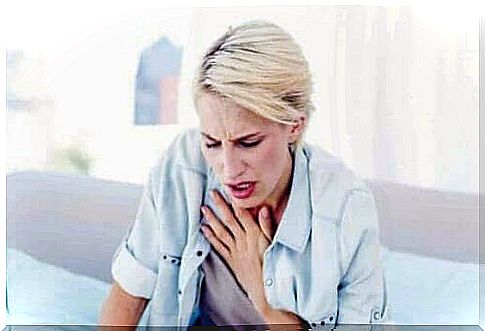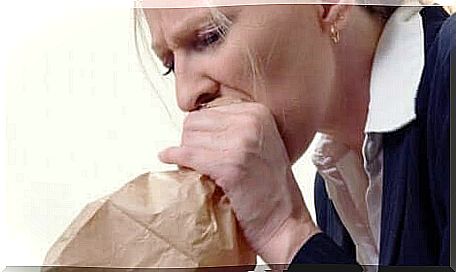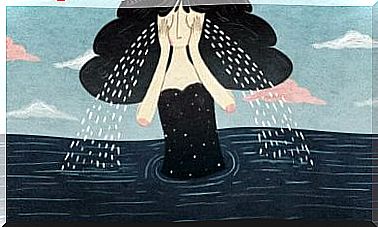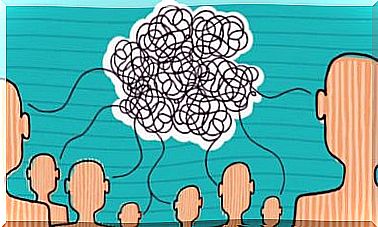What Is The Connection Between Hyperventilation And Anxiety?

Breathing problems, fast heartbeat, dizziness, numbness, tightness in the chest, fear… Hyperventilation and anxiety are closely related. Feeling short of breath and not getting enough oxygen in your lungs can be a scary feeling. This can also be a direct consequence of some mental disorders, which many do not know.
Not everyone relates this feeling to anxiety. People usually think they have asthma or another heart-respiratory problem. Nevertheless, if you go to the emergency room or see your doctor and they rule out physical causes, you may feel confused. So how can anxiety cause something so painful?
You may forget that this mechanism of expectation of external and internal stimuli is directly related to the breath. The body’s priority, in response to anxiety, is to respond to it. To do this, your heart rate increases and the amount of oxygen that your muscles receive increases. The goal is simple: to escape from the wild beast that is after you.
Remember that hyperventilation is not a disease. It’s not serious and you can not die from it. It is a side effect of anxiety that people with panic disorders often experience. Let’s dive right into it.

Hyperventilation and anxiety: symptoms, characteristics and how to deal with it
Anxiety is one of the clinical conditions that causes most physical symptoms. Studies conducted at the University of Health Sciences at Chicago Medical School show that on average being very sensitive to anxiety is a risk factor for panic attacks and in turn hyperventilation.
It is important to note that hyperventilation or shortness of breath can certainly be a sign of another problem that is not purely emotional. Asthma, emphysema and other lung problems can also explain this sudden breathing problem. Regardless, the best course of action is to consult your doctor to get a proper diagnosis.
Why do you hyperventilate when you feel anxious?
When you breathe faster than you need to meet your body’s oxygen needs, you hyperventilate. This happens, as you may imagine, in stressful situations or when your anxiety reaches increased or uncontrollable levels. You do not realize that you are breathing too fast, and you are creating an imbalance in the oxygen level.
- Hyperventilation disturbs the balance between oxygen and carbon dioxide.
- Your brain interprets this sudden drop in blood carbon dioxide levels as a threat.
- The goal is to stabilize the situation by reducing the levels of inhaled oxygen and exhaled carbon dioxide as quickly as possible.
- Your body does this by lowering the impulse to breathe. That is, your brain sends a message to reduce your breathing, this is where the feeling of suffocation comes from.
- While you are desperate to breathe, your body actually makes it harder, which obviously intensifies the panic and anxiety.
While it is true that hyperventilation is not serious and no one has ever died from it, it is very scary.
Symptoms of hyperventilation and anxiety
Hyperventilation and anxiety are closely related. When your emotional load is high, your body responds. Usually the physiological response is intense.
The most difficult thing about these situations is that the experience of a panic attack or hyperventilation only increases the fear and anxiety. It’s a vicious circle. The following are the most common characteristics of this hyperventilation and anxiety cycle:
- Hyperventilation caused by anxiety tends to last for about 20 minutes.
- You will feel increased physical and emotional tension.
- It can make you feel like you can’t breathe, as if you are short of breath. The feeling of suffocation slowly worsens.
- Your heart beats faster and harder.
- You may feel a tingling sensation in your hands, legs and around your mouth.
- Dizziness and tunnel vision are common.
- Sweat.
- Headaches and fainting are also common.

How to deal with hyperventilation
When you hear the word hyperventilation, you probably see someone breathing in a paper bag. While this is actually a good strategy, there are other aspects to think about as well.
- Hyperventilation is not a disease. It is a symptom and it is important to know the source. The first step is to rule out physical conditions.
- If anxiety is causing your hyperventilation, try to identify what triggers your anxiety.
- Cognitive behavioral therapy, rational emotional behavioral therapy, cognitive therapy aimed at hyperventilation solutions, or EMDR (Eye Movement Desensitization and Reprocessing) can provide good results.
- On the other hand, if you have a hyperventilation attack, it is important to focus on your breathing.
- If you breathe faster, the feeling of suffocation will get worse. Instead, slow down your oxygen intake.
- Breathing with tight lips, as if blowing out a candle, can help.
- There is also another strategy you can try. Cover one nostril and breathe through the other. This is another effective way to breathe more slowly.
Finally, you can always try the classic paper bag technique. All you have to do is cover your nose and mouth with the bag and start breathing. It will help reduce breathing and also balances CO2 levels. To quit, be sure to find out what triggers your breathing problems and get help.









